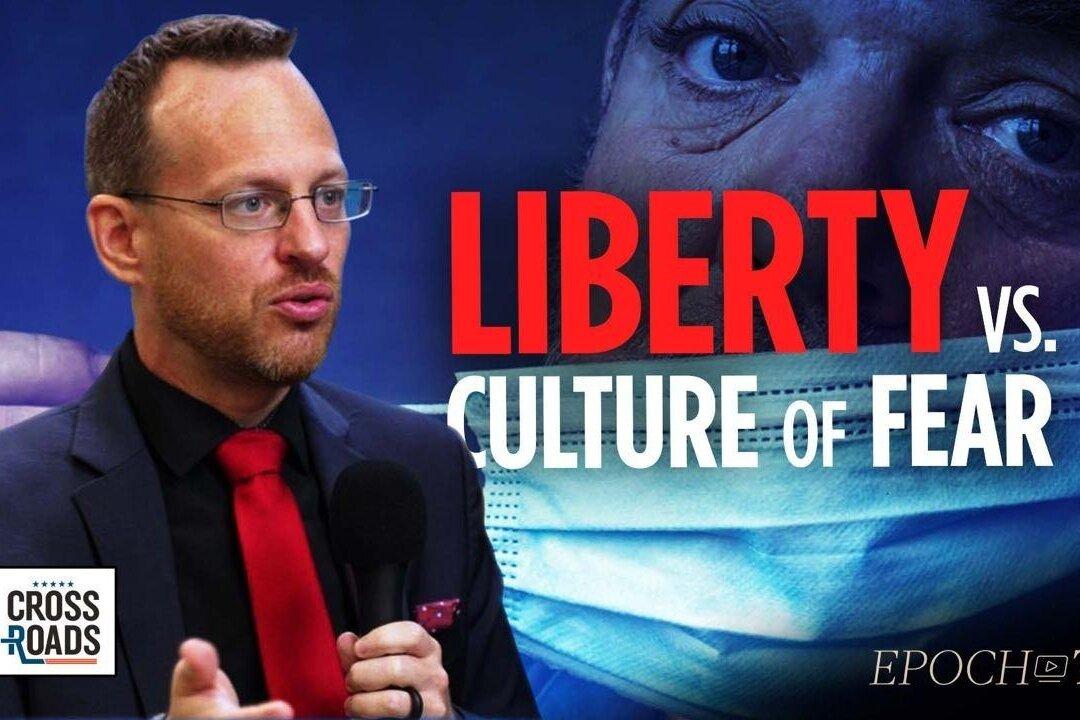In 2020 the Libertarian Party, in a move I found baffling, chose a college professor by the name of Jo Jorgensen as their presidential nominee. She was, in my opinion, an absolutely terrible candidate, even though she was a longstanding member of the Party. Whereas many male Libertarian Party members (and there are a lot—they make up 63 percent of the Party) sometimes come across as robots, Jorgensen came across like a typical college professor who has never actually set foot in the real world. She may have been an attempt by the Party to draw more women voters to its platform, but pandering never works, and if the Libertarians did fall victim to the siren song of diversity and inclusiveness, they’d be wise not to do so again.
Philipp and Cohen begin their discussion around the idea of culture, an arena that the Democrats have inarguably dominated for years. The term “culture war” has been around for a century, though it didn’t start to move front and center until the 1990s. Cohen doesn’t discuss hot-button items like abortion rights or gun control, instead talking about the culture of fear that’s been gripping many Americans over the last year and has led entire states to happily give up just a little freedom for safety.
As a Libertarian, he is obviously on the pro-freedom end of the spectrum, though he recognizes that the Libertarian Party’s more philosophical approach to problems is usually a terrible way to talk to the average person about why allowing citizens more freedom will lead to better outcomes. The average person is too busy trying to slog through their daily lives to sit down and talk about problems on a philosophical level, especially when the government has spent decades convincing the populace that it’s the only one capable of addressing massive problems. Even though the government has shown time and time again that it’s actually terrible at addressing massive problems, it’s all most people know, so Cohen focuses on finding a way to talk to ordinary Americans about freedom that will resonate as practical rather than philosophical.
In addition to admitting that Libertarians tend to be more philosophical in their approach, Cohen also freely admits that they often fall into the trap of talking about issues from a more cerebral perspective rather than an emotional one. As Philipp points out, the Democratic Party has been highly successful at directing culture for many years, which they do largely by playing to people’s emotions. Cohen talks about the makeup of the Libertarian Party, explaining that many members are engineers or business owners who look at problems systemically, trying to figure out what caused a certain outcome so they can either duplicate the result if it had a good outcome or make sure it never happens again if it had a bad outcome. The issue for a party that could be considered more left-brain is to explain to a population that tends to be more right-brain how liberty-based policies are in everyone’s best interest, without the left-brains sounding like they came from another planet. Their ideas usually make sense to anyone who takes the time to listen to them, but they’re terrible at the messaging. Cohen emphasizes the need for Libertarians to find ways to talk to people without sounding like they’re lecturing a class on economics.
The interview then turns to a favorite subject of Libertarians: the idea that taxation is theft. Cohen repeatedly uses what could almost be a Libertarian slogan at this point, that the government holds a gun to citizens’ heads in order to steal their money. It isn’t particularly nice imagery when trying to reach out to the emotional right-brains of the world, but it also isn’t wrong. Cohen succinctly explains that the government truly does acquire all its resources through the use of force, regardless of whether a literal gun is used, and judging by the protests against police, mandates, or the 2020 election, very few are happy with what they’re getting for their money. If you try to evade paying taxes you can have your wages garnished, your business fined, or even end up in jail. On the local level, if you just decided to stop paying school taxes, the government would take your house. It’s all theft, and the thieves have absolutely no incentive to provide the population with anything of value. You can’t just stop paying taxes because you don’t like the government’s foreign policy, because the government will literally come after you. There’s simply no reason for the government to cut back on spending or try to increase customer satisfaction with what it produces. As Cohen says, “Violent monopolies are not a good way to get services.”
Cohen’s alternative to this is one of the more pie-in-the-sky Libertarian ways of looking at things, but it’s worth listening to as a way to start a conversation about alternatives to the government providing services. He suggests funding many things currently provided by the government through voluntary fees. Someone could choose whether or not to contribute to the police fund, for example, and based on that they would either be eligible or ineligible for police protection. They could choose to fund the public schools and would either be eligible or ineligible to send their children to public school based on their choice. It’s an idea that definitely has some pitfalls. Would we really be comfortable as a society denying police assistance to rape victims or someone who had been stabbed in their home because they chose not to contribute to the fund? Still, it’s these kinds of ideas that spark long overdue conversations on how to get government out of areas of society where they demonstrably make everything worse.
Philipp shifts the conversation then to a discussion of big business, knowing that Libertarians have a tendency toward what many perceive to be a naive, total embrace of the free market system. Cohen gladly takes up this topic, outlining the ways in which big business has long worked with the government in a clear “you scratch my back, I’ll scratch yours” relationship that has allowed not only more oppressive policies from government, but big business as well. Nowhere is this more evident than the recent revelations that the federal government has been directing social media sites like Facebook and Twitter to censor different news stories the government arbitrarily considers to be misinformation. It almost rises to the level of quid pro quo. The federal government drags its feet on doing anything to change Section 230 and social media sites ask, “How high?” when the government says, “Jump.”
This leads naturally into a discussion of the ways in which any kind of coercive monopoly can do whatever it wants to the little guy, whether that monopoly is the government or the rum runners during the Prohibition era. Philipp goes on to bring up the ways interventionist policies in business and social issues give the government greater reach into the everyday lives of citizens than it has ever had before. It also interferes in the free market to turn it into something that doesn’t come anywhere near to being free, allowing the government to pick winners and losers in industry or to throttle entire business sectors on a whim.
Cohen explains that this is “corporatism,” a word that should be used with far more frequency in the modern lexicon. It should certainly be spoken loudly and repeatedly whenever anyone argues in favor of shifting our entire system of government to socialism because the current capitalist system doesn’t work. Cohen does an excellent job of pinning down exactly what corporatism is—the economic plank of fascism—where the government uses business as a go-between to control the population. If the government wants people to buy more electric cars, it invests huge swaths of money in charging stations while placing ever more onerous restrictions on emissions for new gas powered vehicles, or—as California has recently done—they set a date for when it will be illegal to sell new gas powered vehicles in the state. These policies don’t care about providing the population with a good, affordable product. The point is to control the public’s decisions and force compliance with government goals. This corporatism doesn’t care about making anyone’s life better, and is therefore destined to make it worse. Cohen again argues that the more the government has control, the worse everything will get, and the only solution to this is to find our way back to our founding principles of freedom. This can only be done through changing the culture until it begins to make its way into politics.
Having brought the conversation back around to liberty, Philipp gives Cohen a chance to address some of the main questions he’s presented with when trying to explain Libertarian concepts to new audiences. It isn’t uncommon to hear that someone wouldn’t be able to afford health insurance without Obamacare, or to wonder who would take care of the roads. Cohen gives detailed examples of how it is, in fact, government taxation and mandates that drive up the cost of healthcare to begin with, and argues for reducing federal involvement in things like policing to give local municipalities more control over an organization that is currently taking a lot of flak. Philipp points out that Cohen’s arguments stray toward the oft-lobbed criticism that Libertarians are really just anarchists who don’t want any form of government at all, which certainly isn’t true. To his credit, Cohen identifies himself as an anarcho-capitalist (probably why they went with Jorgensen at the top of the ticket) who does feel that all government services should be funded through voluntary means, but that certainly doesn’t mean he wants no government at all. He merely seeks a system where the government truly derives its powers from the willing consent of the governed, which is definitely not what we have now. Though many feel anarcho-capitalism may not be the way to go, it’s certainly worth discussing as an alternative when American progressives so openly champion socialism as if it is the only other option to capitalism.
Also to his credit, Cohen recognizes that Libertarian ideals are not anything that could persist in the long-term, and that in order to keep any kind of control in anarcho-capitalism or minarchism is for the populace to remain hyper-vigilant. Philipp rightly questions how to go about that when we have examples from history, such as the decline and fall of the Roman empire, human beings have a tendency to grow tired of what they perceive as the chaos of having too much freedom and turn to the government for stability. Here Cohen falls into the left-brain trap of thinking it will be enough to continually explain to people the many benefits of freedom rather than finding some way to reach out emotionally to right-brained people, but his passion on this subject is commendable. He mentions that vigilance includes many things, like fighting, disobedience, and non-compliance, and uses the favored Libertarian policy of legalizing marijuana to highlight just how well these non-violent tactics can work. Cannabis may still be illegal at the federal level, but so many states have legalized the use of marijuana for either medicinal or recreational purposes that the feds can’t effectively enforce their laws against what those states consider to be legal growers and consumers.
Philipp finds this kind of civil disobedience to be something new among conservatives and people on the right, with the left far more organized when it comes to pushing back against something en masse. Cohen outlines the strange paradoxes within each of the political sides, where the right is more likely to speak out against government overreach yet will argue they must back the police no matter what; while the left will protest against the renaming of a street sign if they think it’s a symbol of systemic racism, but insist that the only way to get systemic racism out of government is through even more government. Libertarians keep their priorities much simpler, putting liberty at the top of the list and focusing their efforts on forwarding that, rather than protecting the police at the cost of allowing them to violate constitutional rights or demanding the government create 50 different committees to look into why government-run schools are failing in inner cities.
Cohen closes out his argument for why liberty is important by reminding the viewer that it was obvious how terrible the government was long before 2020, though the last 18 months have certainly woken a lot of people up. He stresses the need to return to the original ideals and freedoms the country was based on—that the government should fear the people and not the other way around—as the founders intended. While he does sometimes drift into cerebral discussions he acknowledges Libertarians to be guilty of focusing on, Cohen is more than worth listening to and his ideas should have a place at the table when talking about how to dig ourselves out of the hole we’re in. Anarcho-capitalism is not likely to sway many hardcore socialists away from the idea that the corrupt government that’s ruining everything will somehow stop being corrupt if they just get the “right” people in office, but that’s not really the point. Cohen’s arguments for liberty are compelling and should be watched and shared so we can at least start a conversation about ways to start changing a government that no longer works for anyone but itself.




